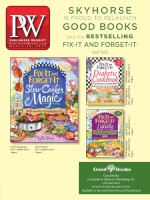I never meant to be a novelist, much less one who writes commercial fiction. Yet as I look back on the arc of my career, I realize I was headed here all along.
I was always an avid reader. During my childhood, every family movie began with a giant pair of adult hands snatching a book away from my face, leaving me as blinking and defenseless as a tunneling mole dragged into the light by a cat. Because my father was in the Navy, we moved often and abruptly; I read constantly because I had few friends. It didn’t help my popularity that the locket I wore around my neck held a photograph of my horse instead of a boy.
So of course I loved horse stories, such as My Friend Flicka and The Black Stallion, but I waded into swampier fiction territory early on. From my grandfather, who collected towering stacks of paperback mysteries, I borrowed books that taught me how to drop clues like honey on every page, gobbling up tales of rape, murder, and kidnappings.
My mother was certain that aliens walk the earth and that telepathy is a skill like any other. I happily marched my way through her science fiction novels: books by Isaac Asimov, Arthur C. Clarke, and Frank Herbert. At our tiny town library, I also found Shakespeare’s tragedies, George Orwell’s essays, and the novels of Henry James and Edith Wharton. Meanwhile, my babysitting jobs offered ample entertainment in hidden nightstand copies of books like Valley of the Dolls.
I took my first stab at writing fiction when I was 16. I had a job that summer at a furniture factory run by Seventh-Day Adventists who put me on the assembly line despite my shaky religious views. During lunch breaks, I’d sit in the shade behind the factory with pimply teenaged boys wearing neckties who were too shy to speak to me, the blue-jeaned hippie chick. As I ate sandwiches of limp white bread and bologna, I scrawled romance stories on yellow-lined paper, convinced I could give up the factory job if I sold them to pulp magazines. I never sold a word, but I still remember those lunch breaks as the most enjoyable ones I’ve ever had.
I abandoned writing once I hit college. Determined to do good in the world, I decided to become a doctor, the sort who would travel to Africa and cure plagues. However, as I was finishing a biology degree and about to apply to medical school, I took a creative writing class and discovered that seven hours could pass like seven minutes while writing fiction. Suddenly, I wanted to be a writer. A real writer, like Virginia Woolf and Hemingway. I decided not to apply to medical school—you can imagine my father’s reaction—and instead set out to earn a Master’s in Fine Arts in creative writing, determined to learn how to write “real” literature.
After enrolling, there followed two years of study and intense workshops with people unlike any I’d ever known. These were “real” writers, students and professors who’d been reading and analyzing literature all their lives. Many wore tweed jackets and smoked. They listened to jazz! I admired them and their writing, too. They already knew all about metaphors and similes, narrative arcs and points of view. I struggled to catch up.
I was devastated when, during my M.F.A studies, one of my professors announced to the workshop at large that I had turned in a short story “with about as much depth as a television commercial.” I went to the ladies’ room and cried during the class break.
I refused to quit writing, though. I kept plugging along, writing story after story, until one of my pieces finally won the program’s top literary prize. My thesis was a novel as experimental as everyone else’s and led to my first agent. That novel was oh so profound, littered with original metaphors and good intentions, and graced with an unhappy but poetic ending. That novel was also deemed unmarketable, according to every editor who saw it.
It took me a half dozen more unpublished novels before my agent sold one. And guess what? The manuscript that sold was the first book I’d written that was commercial fiction—an emotional family mystery. Looking at it now, I realize that the novel incorporates everything I have ever loved about reading: characters in turmoil, exotic places, and secrets revealed page by page, until (I hope) the reader is racing along to the book’s conclusion, staying up all night to find out what happens next.
Yes, I write commercial fiction, and I love it. What else could I write, when that’s what I love to read?
Holly Robinson is a novelist, journalist, and celebrity ghost writer whose newest novel, Haven Lake, will be published by New American Library in April.



 Volume 262
Issue 11
03/16/2015
Volume 262
Issue 11
03/16/2015





